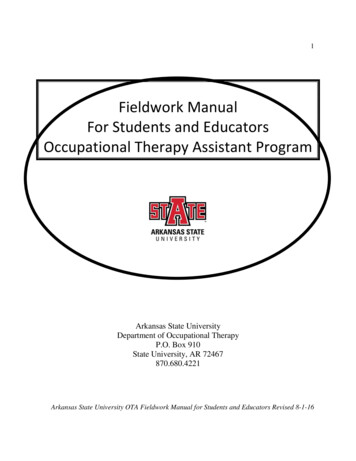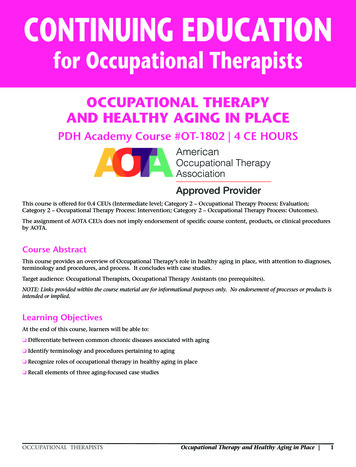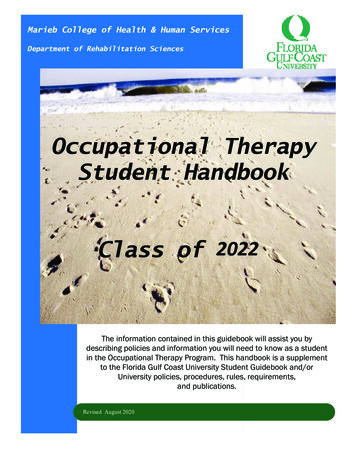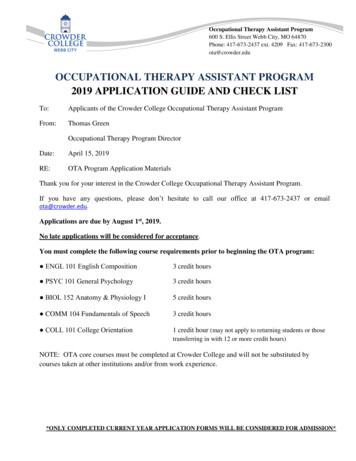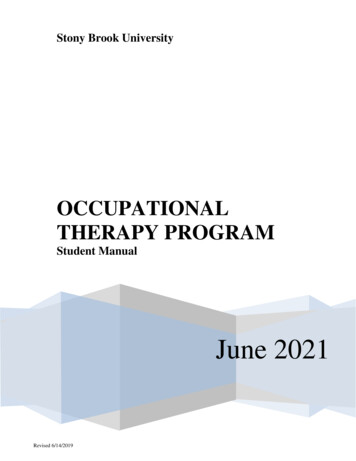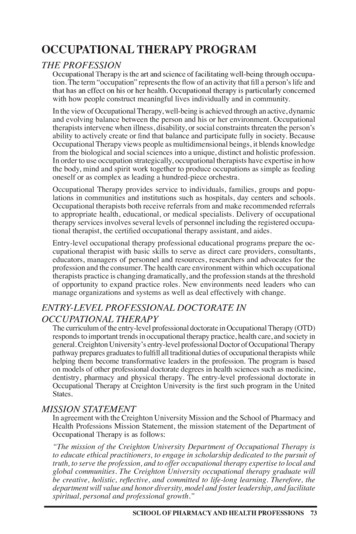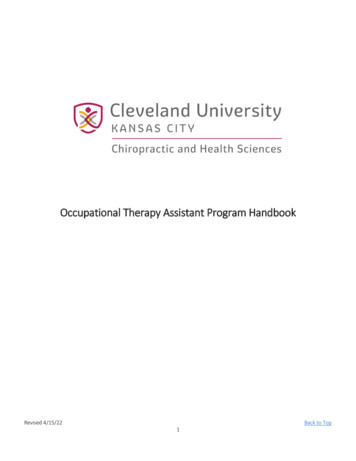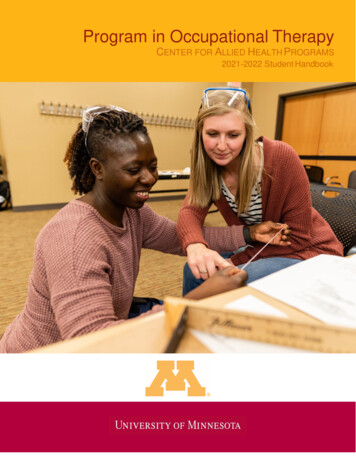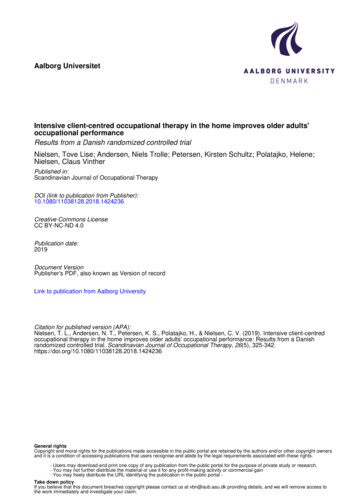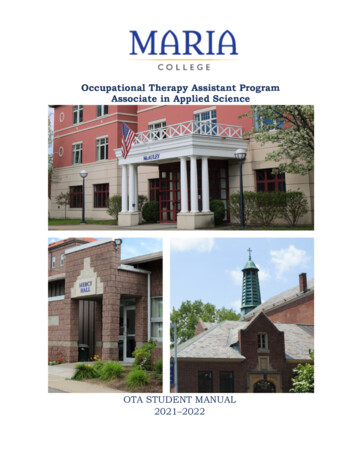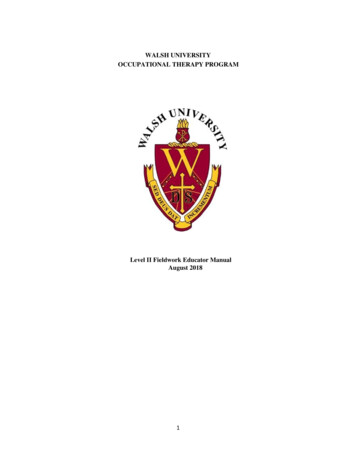
Transcription
WALSH UNIVERSITYOCCUPATIONAL THERAPY PROGRAMLevel II Fieldwork Educator ManualAugust 20181
Table of ContentsIntroductory Letter/Contact Information3Liability Insurance4Program Mission & Philosophy5Program Student Learning Outcomes (PSLOs)5Course Sequence6Fieldwork7Health Requirements7Fieldwork Educators (FWE)9Preparation for Level II Fieldwork Experiences10Occupational Therapy Fieldwork Education: Value and Purpose12Practice Advisory: Services Provided by Students in Fieldwork Level II Settings14OT/OTA Student Supervision & Medicare Requirements15HIPAA Guidelines for Fieldwork18Answers to Your Fieldwork Questions19APPENDIX 1 Student Evaluation of FW Experience22APPENDIX 2 Template for Learning Contract302
Occupational Therapy Program 330-490-7236School of Behavioral and Health SciencesTo: Walsh University Student Fieldwork EducatorThank you for accepting a Walsh University Masters of Occupational Therapy Student to your site for fieldwork. It is ourpleasure to partner with you as a local clinician to enhance student learning as we prepare entry level occupational therapypractitioners. We thank you for your willingness to share you expertise and invest in our students.Should you have any questions or concerns, please call or email:Michele Tilstra, OTD, OTR/L, CHTAcademic Fieldwork CoordinatorEmail: mtilstra@walsh.eduPhone: 330-490-7410Cell Phone: 330-472-4197Thank you again and I look forward to working with you!Michele Tilstra, OTD, OTR/L, CHTAcademic Fieldwork Coordinator3
4
Walsh University Occupational Therapy ProgramProgram MissionThe mission of the Walsh University Occupational Therapy Program reflects the philosophy and vision of theprofession of occupational therapy. The Occupational Therapy Program provides an educational experience thatintegrates active learning techniques, evidence-based practice, and collaboration with faculty who engage inscholarship. The program supports personal and professional growth through lifelong learning, critical thinking,professional behaviors, inter-professional collaboration, cultural awareness, and spirituality.Graduates will facilitate participation in meaningful and necessary occupations with clients, families, and organizationswithin in their communities. Graduates will contribute to the future of the profession through leadership, scholarlyactivities and service. The Occupational Therapy Program supports the mission of Walsh University and the School ofBehavioral and Health Sciences, which encourage individuals to act in accordance with reason guided by the exampleand teachings of Jesus Christ.Program PhilosophyThe use of occupation and occupational engagement as a means to enhance individual, community, and global health isfundamental to the profession of occupational therapy. We believe human beings have an innate desire to leadmeaningful, productive lives. Participation in occupations enhances lives across the lifespan by maximizing functionalability and promoting self-determination. Occupational therapists provide professional services for individuals orgroups to enhance the quality of occupational performance and participation in society. We view our students as activelearners who require dynamic, realistic contexts to synthesize knowledge and develop critical thinking skills. Webelieve our students have an inherent desire to promote and advance the profession of occupational therapy throughlinking education to evidence-based practice and participating in scholarly activities.Program Student Learning Outcomes (PSLOs)Building on a solid grounding in the liberal arts, the graduate level program focuses on the development of studentsemphasizing those values and characteristics that will enable them to function as competent providers ofoccupational therapy services. Upon completion of the Occupational Therapy Program:PSLO 1: Graduates will demonstrate core knowledge competencies in the foundations and basic tenets of occupationaltherapy.PSLO 2: Graduates will apply clinical skills of screening, evaluation, intervention, and referral in occupational therapyservice delivery.PSLO 3: Graduates will support clinical decisions with relevant, current evidence.PSLO 4: Graduates will model professional, ethical behaviors, and a respect for diversity in all interactions consistentwith the profession of Occupational Therapy.PSLO 5: Graduates will engage in service to communities at large.To achieve these outcomes, the students must demonstrate the general knowledge, skill, and mindfulness of a competentoccupational therapist who exhibits the Judeo-Christian values of Walsh University.5
6
FIELDWORKPhilosophy of FieldworkAs an experiential learning process, fieldwork (FW) education represents an integral part of the total occupationaltherapy curriculum. Attainment of competencies as an occupational therapist depends upon integration of didactic andclinical learning experiences. While didactic education provides a basis for the development of appropriate problemsolving abilities and a knowledge base, clinical education provides an opportunity for refinement of the knowledge,skills, and attitudes that characterize a competent, entry-level practitioner. Clinical education requires mutual endeavorsby the academic faculty, the clinical faculty, and students to achieve the common goal of clinical competence. Theacademic faculty holds primary responsibility for didactically preparing students and coordinating their placements inappropriate clinical facilities. The clinical faculty provides appropriate learning experiences and evaluates students’performance. Responsibilities of students include recognition and communication of their own abilities and limitationsaccording to academic level, previous clinical experiences, and personal attributes. All involved individuals mustcommunicate efficiently and effectively to attain the overall goal of clinical competence.Level I fieldwork (occurring during 3 semesters) provides students with hands-on learning and application in a widevariety of community-based settings with populations across the lifespan. In level II fieldwork, students areimmersed in the OT field in 2-3 settings for 24 weeks total.Progression of Fieldwork Placements: Level I A- Spring Semester; First year students; 2-8 hours at each setting; Observation and introduction to clinicalsettings with participation in professional conduct including interactions with clients and other professionals. Level I B- Summer Semester; First year students; 8-16 hours at each setting; Observation and participating in directedclient treatments/ evaluations with direct line-of-sight supervision Level I C- Fall Semester; Second Year students; 24 hours in each setting; Students need to demonstrate problemsolving, treatment planning, choosing appropriate assessments, and documentation of both individual and groupinterventions. Level II AB- Spring- Second year students; Full Time clinic x 12 wks.; Students will need orientation and gradual buildup of responsibilities to function as occupational therapist with distant supervision. Level II CD- Summer- Secong Year students; Full time clinic x 12 wks; Students should ramp up to supervision levelfairly quickly with goal for end of rotation for student to be at entry-level competency.Travel & Financial ResponsibilityStudents are responsible for the cost of travel and parking associated with the FWI experiences. Students areresponsible for travel, parking, and housing associated with FW II experiences. The university does not provideassistance in locating housing; this is the student’s responsibility.HEALTH REQUIREMENTS FOR MOT STUDENTSPhysical and Mental Requirements for Program AdmissionStudents matriculating in the Occupational Therapy Program at Walsh University must have: Adequate gross and fine motor ability for safe performance of patient examination and interventionprocedures. Adequate visual, auditory, tactile and kinesthetic senses for obtaining accurate examination andinvestigative findings. Ability to think critically and solve problems. Ability to communicate effectively (oral, nonverbal and written). Ability to organize and effectively manage tasks. Adaptability to perform tasks with persons from diverse backgrounds in a variety of settings.7
Physical and Mental Requirements upon Program MatriculationTo insure the safety of patients and students, students must follow certain health practices. Because of contractualagreements with community agencies, and because of the physical and mental demands of the profession (outlinedabove), students must maintain an acceptable degree of health to remain within the program. This includes updating theirhealth records to demonstrate adequate health and immunization. Students are expected to report any changes in their health status that will interfere with either theirclassroom or clinical performance. Students who experience dramatic changes in health that restrict their potential to meet the physical andmental demands of the profession, will be reviewed on a case-by-case basis. Students who do not meet the health requirements of the program will not be permitted to participate inthe clinical experience component of the program.Faculty will monitor students’ ability to perform technically to all standards and will address with students or takeappropriate action as is deemed necessary for the safety of themselves, peers, faculty and the public.Physical ExaminationAll Occupational Therapy students are required to submit certification of a complete physical examination toCastlebranch by August 15, signed by their physician or certified nurse practitioner prior to entry to the program. Astandard form provided by the program prior to matriculation outlines all information and testing required. This form isincluded in the registration materials and students must complete and turn in the physical exam form by the due datestated in the registration materials by uploading the form to their Castlebranch accounts. In instances where clinicalexperiences require a physical examination within a specified time frame, students must obtain an examination withproper documentation prior to this clinical experience, or they may forfeit their opportunity for the experience.Proof of ImmunizationsStudents must submit proof of immunization for the following: Measles, Mumps, Rubella, also known as MMR: 2 documented doses OR positive antibody titerDiphtheria, Pertussis and Tetanus, also known as DPT: complete documented childhood series as well asthe adult booster (Tdap) in the past ten years,Varicella, also known as chickenpox: 2 documented doses OR history of disease documented by aphysician, OR a positive antibody titer to document immunity,Hepatitis B: Three documented doses or positive antibody titer.o Students who refuse the hepatitis B series must sign the Walsh University Hepatitis B declinationform. As most agencies now require the vaccination for students assigned for fieldworkexperience, refusal of vaccination may limit choices for fieldwork experience.If no medical documentation exists for the above vaccinations, students must provide proof of immunestatus with positive antibody titers, which are quantitative blood tests. If the titers are negative and do notprove immune status, students must proceed with the required vaccinations and a follow-up titer may berequired.Yearly influenza vaccine in the fall semesterOther Testing Required for the Program Two-step Tuberculosis Skin Testing, also known as Mantoux or PPD test, for tuberculosis.o It is students’ responsibility to stay current with tuberculosis testing on an annual basis;failure to do so may result in loss of clinical placement.o If the skin testing is contraindicated, students may opt for the quantitative blood tests,QuantiFERON Gold or T-Spot.Based upon the recent increase in the occurrence of the hepatitis B virus (HBV) and the human immunodeficiency virus(HIV), the Occupational Safety and Health Agency (OSHA) has put into effect new standards for employers to followfor the protection of their employees with occupational exposure. Because of this, the Occupational Therapy Programdeveloped policies regarding the protection of the students and the patients with whom they interact.8
Medical RecordsStudents’ medical records are stored electronically in their Castlebranch accounts. Students are required to keeppersonal copies of all medical records. Students who request copies of these records from the program office willbe charged a fee. The program will not fax or email medical records to any facility without the explicit permissionof the student.Universal PrecautionsTo protect against exposure to communicable pathogens, such as HIV, HBV or TB, the program will instruct all studentsin the use of standard (universal) precautions. Students will treat all body fluids as if infectious while on clinicalassignment. These requirements reflect federal law instituted by OSHA and as all employers must comply, all studentsmust comply.PregnancyImmediately upon medical confirmation, female students must report a pregnancy to the Program Director. Becausesafety to the student and the unborn child is the primary consideration, a medical authorization to continue thestudent’s education during the pregnancy must be completed by the student's physician and returned to the ProgramDirector.Medical Insurance CoverageStudents must provide yearly proof of medical insurance coverage while they are in the program. Changes to a student’smedical insurance coverage must be entered promptly into his or her Castlebranch account. If a student’s name does notmatch the name on the insurance card, the student is required to submit proof from the insurance company that he/she isa dependent on the policy owner’s policy. If there is any other dependent information listed on this document, thosefamily member’s information must be blacked out, leaving only the policy holder and student’s information visible.Post-Illness Readmission to Clinical AreaStudents returning to a fieldwork experience after an illness must consider the nature of the illness as to whether theycan practice safely. If the nature of the illness endangers either student or patient safety, the fieldwork supervisor,Clinical Fieldwork Coordinator or AFWC, may require that the student submit written documentation from thestudent's physician verifying that the student is able to return safely to the clinical area. The student will be readmittedto the clinical area at the discretion of the fieldwork supervisor or AFWC.FIELDWORK EDUCATORS (FWE)Evaluation of Fieldwork Educators. The Academic Fieldwork Coordinator (AFWC) or other designated faculty evaluatesFWE effectiveness during on-site visits and/or other communications during fieldwork experiences. Verbal feedback isprovided to the FWE on issues pertaining to planning educational experiences and how to effectively provide feedbackand guidance on student fieldwork performance. The AFWC uses the information gained through site visits/midtermconferences, other communications, student assessment of fieldwork instruction and FWPE data to evaluate FWEs.In the event an individual FWE’s performance is a cause of concern for the student or the program during a fieldworkexperience, the AFWC would communicate, either verbally or in writing, those concerns to the individual. The AFWCand the FWE would develop an individualized development plan for the FWE designed to strengthen areas ofperformance that need improvement.Evaluation of Fieldwork Sites. The AFWC and other designated faculty evaluate the effectiveness of a fieldwork site on aregular basis by reviewing the quality of student fieldwork experiences in a selected time period. Quality is defined atminimum, to include: timely communication by FWE with the AFWC and/or student throughout a student fieldworkexperience; opportunities offered to students and the program in regard to exposure to patients and practice managementissues related to occupational therapy practice; and accurate assessment of student performance using the programdeveloped forms (Level I) or American Occupational Therapy Association’s Fieldwork Performance Evaluation (FWPE)9
(Level II). Feedback is provided to the fieldwork site through the FWE either verbally or in writing as needed about areasof strengths and areas that may need further development in relation to the fieldwork education of students from the OTprogram. Students will also complete the Student Evaluation of Fieldwork Experience (SEFWE) at the end of their LevelII fieldwork placement. SEE APPENDIX 1.FWE Responsibilities and Expectations.Minimal expectations of FWEs during a student experience are:1) Provide students with feedback on their performance and FWE expectations;2) Identify areas that students need to improve and any areas for concern;3) Complete student assessment forms (program developed for Level I or FWPE for Level II);4) Develop an ongoing, progressively challenging learning environment for students.PREPARATION FOR LEVEL II FIELDWORK EXPERIENCESCommunications: Communication is the essential element to ensure expectations are known for all involved.By the program to the fieldwork site. The AFWC will notify each fieldwork site of student placement for thenext calendar year by the end of March. The AFWC also sends the FWE materials about the upcoming experience at least8 weeks prior to the start of a Fieldwork Experience. These materials include a student data sheet which provides basicinformation about the student regarding whom to contact in the event of an emergency situation, as well as the student’sspecial interests for the professional experience rotation; review of student preparation in regard to academic preparation;information pertaining to filling out the FWPE; and other materials as needed.By students to the fieldwork site. Students will contact the fieldwork site in writing a minimum of 6-8 weeksprior to the first day of a Fieldwork Experience. Students are required to send a letter of introduction and his or hercurriculum vitae (CV) to the FWE. The letter serves as an initial contact between the student and the FWE and gives thestudent an opportunity to ask questions that remain unanswered or unclear after review of site information available to theprogram by the student, and to express special interest or special needs they may have concerns about during theexperience. The CV serves as information about the student to the FWE. It also serves as a model for students todocument their future professional activities and to document his/her participation in life-long learning. The letter ofintroduction and CV should be mailed to the FWE, but may be sent electronically if an email address is made available tothe student. Students are encouraged to follow up with a phone call to the FWE at the assigned fieldwork site at least 2weeks prior to the start date.Midterm communications: At the midpoint of each fieldwork experience rotation, the FWE and the student arerequired to have a private meeting for a midterm evaluation of the student’s progress to date. The FWE will provide anevaluation date. The student is required to perform a self-assessment using the FWPE.The AFWC or other designated faculty will assess student progress during each fieldwork experience. The timingand the method of this assessment will be dependent upon the needs of the program, the site, the length of the placement(6 or 12 weeks), the student and/or the FWE. Timing of the assessment generally occurs during weeks 3-7 for a 12-weekexperience. Methods of assessment include either an onsite visit, a telephone contact, or electronic mail communication.Fieldwork Experience Student Assessments. Students are expected to progress in level of independence throughout thefieldwork experiences.The OT program uses the American Occupational Therapy Association’s Fieldwork Performance Evaluation to assessstudent competence throughout each fieldwork experience. The AOTA evaluation forms will be provided to theFieldwork Educator by each student upon arrival at the fieldwork site. Due to copyright restrictions, there is not acopy provided in this manual, but a sample can be seen at ls/otd-sampleevaluation.pdfThe FWE is expected to use this tool to document student performance at the time of the mid-term and final evaluation.The student will use these tools also for self-assessment at mid-term and final evaluation. A copy of each assessment may10
be retained by the FWE. The original reports, however, must be placed on file with the AFWC. The final assessmentmust be signed and dated by the FWE and the student.The student must return the ORIGINAL final, completed FWPE, to the AFWC no later than three (3) workingdays of the last date of the fieldwork experience unless otherwise specified by the AFWC. Please note thata student cannot receive a grade for fieldwork until this final evaluation has been received.Dr. Michele Tilstra,Occupational Therapy Academic FW Coordinator2020 East Maple StreetNorth Canton, OH 44720Student course assignments during a Professional Experience. Students may also be required to complete an academicproject during each Fieldwork Experience. These projects are used to help students transition the use of evidence basedpractice from the classroom to the clinic. Fieldwork sites may also require students to complete additional projects and/orin-services.The AFWC is responsible for determining the final student grade for each fieldwork experience. The final grade isdetermined after thorough review and assessment of all materials of a select Fieldwork Experience, including but notlimited to: FWE assessment of student performance as provided on the FWPE, including professional behaviorassessment, and successful completion of all other assignments as determined as part of the course. The AFWC or otherdesignated faculty may contact the FWE for further discussion of student performance in the event questions or concernsremain after review of written materials.Remediation/Development of a Learning Contract during a Fieldwork Experience. The FWE may identify studentbehaviors throughout a fieldwork experience that may be cause for concern. The behaviors may be related to a student’sknowledge level, skill level, or professional behaviors. In the event a behavior is identified that may limit the expectedprogression of a student in the clinical environment, the AFWC or other designated faculty, in collaboration with theFWE, will recommend the development of a student learning contract that outlines areas of deficiency and expectedoutcomes. In addition, students will be required, in collaboration with the FWE, to develop weekly goals that address thedeficient area and learning opportunities and resources needed to meet the goals and expected outcomes. FWEs areencouraged to document objectively about the deficient behaviors. Students must provide objective documentation of howprogression towards expected competency was made throughout the remainder of a fieldwork experience. SEEAPPENDIX 2 for Sample Learning Contract.Termination of Fieldwork Experiences. Communication between the AFWC or other designated faculty and the FWEand the student is ongoing. It is the AFWC's responsibility, in consultation with the occupational therapy programdirector when indicated, to intervene regarding a student’s fieldwork assignment in the event progression is not asexpected. This decision would be based on feedback from the student, and FWE. Decisions to terminate fieldworkassignments will be based on concrete, documented information provided to the AFWC. It is recognized by theUniversity that a fieldwork site’s participation in the fieldwork experience of occupational therapy students is voluntaryand not an obligation. Contracts are made in good faith. The decision between the program and the fieldwork site toterminate a student’s fieldwork experience will be based on the best interest of the occupational therapy student, thepatients at the site, and the profession. The student must accept that a FWE may request that a student be removed fromhis or her facility if the facility is not able to provide a safe and effective learning environment, or if the student does notdemonstrate an ability to safely and effectively participate in the learning environment. Likewise, if the student identifiesan irresolvable problem, he or she may request to be removed. In all cases, the AFWC is obligated to discontinue thestudent’s experience at that fieldwork site. Due cause should be identified and documentation of the reason for removalrequest must be submitted to the AFWC.A student’s clinical education assignment may be terminated for the following reasons (list not all inclusive):1. Clinical environment not conducive to the student learning;2. Unprofessional conduct on the part of the student or FWE;11
3.4.5.6.7.Staff turnover or shortage;Inappropriate supervision;Illness;Safety issues;Student’s inability to appropriately transfer cognitive, affective and psychomotor skills from the academicsetting to the clinical setting as assessed by the FWE and/or AFWC;8. 8. Consistent inappropriate dress or appearance;9. Site cancellation;10. Violation of the Code of Ethics, Syllabi, Walsh University Student Handbook, Walsh University,Occupational Therapy Program Fieldwork Education and/or Policies and Procedures of the fieldwork site.Once a fieldwork experience has been terminated, the AFWC, in consultation with the program director, will determinethe progression, remediation or final termination (failure) process of the students experience based on the situation.Because every situation and individual present with different characteristics, every case may be managed differently, butobjectively and fairly.Remediation of a Fieldwork Experience. If a student is given the opportunity to remediate a failed Fieldwork Experience,the student will be assigned to a fieldwork site that meets the student’s needs for the academic program and provides alearning environment that can address the specific needs of the student. A site within a close proximity (within 90 miles)of the OT program is preferable, but will be dependent upon the type of rotation needed and the availability of a FWE tomeet program and student need.When a student is assigned a remediation fieldwork experience, areas of deficiency is provided to the student in writing bythe program director and/or AFWC. The student is responsible, in collaboration with the FWE, to identify learningopportunities that address areas of deficiency. The student will submit a written document stating what will be done withexpected timeframes for accomplishment. The student is required to submit in writing periodic updates to the AFWC forassessment of progress (timeframes to be determined by AFWC and student). The AFWC will consult with the programdirector and/or faculty when needed.The American Journal of Occupational Therapy 7012410060p1Occupational Therapy Fieldwork Education: Value and PurposeThe purpose of fieldwork education is to propel each generation of occupational therapy practitioners from the role ofstudent to that of practitioner. Through the fieldwork experience, future practitioners achieve competence in applying theoccupational therapy process and using evidence-based interventions to meet the occupational needs of a diverse clientpopulation. Fieldwork experiences may occur in a variety of practice settings, including medical, educational, andcommunity-based programs. Moreover, fieldwork placements also present the opportunity to introduce occupationaltherapy services to new and emerging practice environments.Fieldwork experiences constitute an integral part of the occupational therapy and occupational therapy assistant educationcurricula. Through fieldwork education, students learn to apply theoretical and scientific principles learned from theiracademic programs, to address actual client needs within the context of authentic practice environments. During fieldworkexperiences, each student develops competency to ascertain client occupational performance needs to identify supports orbarriers affecting health and participation, and to document interventions provided. Fieldwork education also providesopportunities for the student to develop advocacy, leadership, and managerial skills in a variety of practice settings, whileincorporating principles of evidence-based practice and client-centered care. Finally, the student develops a professionalidentity as an occupational therapy practitioner, aligning his or her professional judgments and decisions with theAmerican Occupational Therapy Association (AOTA) Standards of Practice (AOTA, 2015b) and the OccupationalTherapy Code of Ethics (AOTA, 2015a).As students proceed through their fieldwork experiences, performance expectations become progressively morechallenging. Level I fieldwork experiences occur concurrently with academic coursework, and the goal “is to introduce12
students to the fieldwork experience, to apply knowledge to practice, and to develop understanding of the needs of clients”(Accreditation Council for Occupational Therapy Education [ACOTE ], 2012, p. S61). Furthermore, Level I is“designed to enrich didactic coursework through directed observation and participation in selected aspects of theoccupational therapy process” (ACOTE, 2012, p. S61).Level II fieldwork experiences occur at or near the conclusion of the didactic phase of occupational therapy curricula andare designed to “develop competent, entry-level, generalist practitioners” (ACOTE, 2012, p. S62). Level II fieldworkfeatures “in-depth experience(s) in delivering occupational therapy services to clients, focusing on the application ofpurposeful and meaningful occupation” (ACOTE, 2012, p.
The mission of the Walsh University Occupational Therapy Program reflects the philosophy and vision of the profession of occupational therapy. The Occupational Therapy Program provides an educational experience that integrates active learning techniques, evidence-based practice, and collaboration with faculty who engage in .
